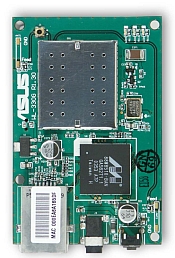While Walter Bender's One Laptop Per Child weekly newsletters are becoming more technical as the 2B1 Children's Machine development moves along, Christopher Blizzard has taken it upon himself to give a very detailed update on the OLPC software and hardware progress. And a detailed update he delivers.
Reading through his One Laptop Update details on kernel, power management, x window, Python, encryption, Sugar, and operating systems, I've noticed interesting snippets that give a window into the evolution of the 2B1 Children's Machine hardware.

OLPC Boot Options
First is the news that the OLPC BIOS is now able to boot from two of the four initial boot option targets. Internal NAND flash and external USB media boot sequences are live, if not yet fully refined and the OLPC team will be developing systems to boot and re-install operating systems over a USB Ethernet device or from on-board USB wireless using a secure BIOS update method.
Then in an exiting development for those concerned about the string power generator output, the current developer boards only use 3 watts of electricity when in an idle state. In fact, in his testingDave Jones has only reached 6 watts and as the 2B1 OS moves to a tickless kernel, the power consumption should drop even farther.
What hasn't dropped are questions around the OLPC's Open Source Manifesto. In the comments section of Mr. Blizzard's post, Theo de Raadt inserts his own manifesto on OLPC's relationship with Marvell, its wireless Internet hardware partner. His basic argument is:

A Marvell Wireless Card
I think it is seriously hypocritical for OLPC to be heading towards Linux BIOS (goal: to not run vendor code) while at the same time they go signing NDA’s with Marvell for the wireless driver (goal: to run vendor code), and then won’t participate with other groups who want Marvell to release documentation for their wireless chips.A few comments later, Christoper Blizzard responds with a patient "Trust us":
The code for the driver for the Marvell chip is available under the GPL and can be found in our recent kernels. (It’s not upstream yet.) We will have an agreement with Marvell that will allow for redistribution of the firmware.While I can understand Theo de Raat's concern, I'm actually going to give OLPC my trust on this very important issue.
Why? Because a month after I pointed out that the SD Card slot on the 2B1 isn't Open Source, OLPC were able to convince the SD Card Association to allow the first truly Open Source SD implementation, with no need to obtain an SDI license or sign NDAs to create SD drivers or applications.
Now I expect that Marvell, looking at millions of wireless card sales, will bend under the same pressure, and open up its firmware to Open Source standards. If so, score another amazing advance for the One Laptop Per Child organization.
Update: If you read the comments below, it seems that OLPC was not responsible for the SD Association's allowance of an Open Source SD implementation, it was Microsoft and HP. That's not only disappointing; it also brings into question OLPC's use of Marvell's proprietary wireless code.


Ooh, there can be an open source SD card driver now? Not just for SD's 1.0 specs? I'm searching for it, but I can't find anything about that except Blizzard's brief mention of it. Does anyone have a link?
Optic,
Walter Bender spoke of it in the October 16 OLPC newsletter. That's the only other mention I've heard about. The SD Association may not have allowed OLPC to release it into the wild yet.
If you find it (or not) please let us know. I'd liek to make sure the SD driver is really Open Source _and_ open for others to use.
Ohhh, thanks. There it is. http://tinyurl.com/qzjrl
Please verify before you make such claims.
The SD spec got opened up by joint efforts of both HP and Microsoft. HP pushed to open them for the benefit of Linux, both handheld and laptop. Microsoft wanted open drivers for WindowsCE.
So having been on the inside of HP, and now on the inside of OLPC, the claim OLPC had any influence on the SD association, or your press article doing so, is incorrect and failing to give credit where credit is due: HP and Microsoft.
And yes, we have an SD slot in the design now, and Linux has the sdhci driver to support SD.